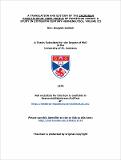A translation and edition of the Sacrorum Parallelorum Liber Primus of Franciscus Junius : a study in sixteenth century hermeneutics
Abstract
In his
preface
to the Sacrorum Parallelorum Libri Tres, Junius
expresses
the confidence that, if he has
not attained the
goal
in
writing
the book
which
he
yearned
to achieve,
he has
at least pointed out to
others the
way of proving more successful.
As the first
monograph on
the use of the Old Testament in the New, the Sacri Paralleli
opened up
new exegetical
territory into
which
hosts
of explorers and,
indeed,
settlers
have
since moved.
The
earlier scouts
in this
region often remind us that
they are travelling in the pioneering
footsteps
of
Franciscus Junius.
Thus, Andreas Kesler in the seventeenth
century
makes use of the Sacri
Paralleli,
as
does the great
Surenhusius
of
Amsterdam in the
eighteenth
century.
Even
as recently as a
hundred
years ago
Eduard Bdhl, in the
historical introduction to his
own
dissertation
on the Old Testament
citations in the New Testament,
wrote:
"Dass
ein
Mann
wie
Franciscus
Junius,
welcher mit
Tremellius das berühmte lateinische Bibelwerk
herausgab,
viel
Gutes bietet, lasst
sich erwarten". Yet,
more recent
surveys of past
literature
on the bi-testamental
passages omit any mention
of
the original spade-work
in the field. Ellis, for
example,
begins his
summary of "the more
direct
study of
NT
quotations" with
the notes which
Drusius
wrote around
1594. No
account of such research,
however,
can
justly
pass over the thorough
work of
Franciscus Junius. Some have
considered
it,
with good reason,
the most
important book of one of
the
most
influential
exegetes
in the Age
of
Orthodoxy. As Cuno
observes,
the Sacri Paralleli
were
truly epoch-making
in the history
of exegesis.
The
present study of
the Sacrorum Parallelorum Liber Primus
begins
with a rather
full
account of
the life
of
Junius for two
reasons.
First, there is
no
delineation
of
his life
available
in English longer than
the brief
article
in the New Schaff-Herzog Encyclopedia
of
Religious
Knowledge.
Secondly, the life
of
Junius
not only
is
very
interesting,
but
also sheds much
light
on
the
rationale of the Sacri Paralleli. There
follow discussions
of
this rationale,
the history
of the Sacri Paralleli
and
the various editions, and
the hermeneutical
principles employed
by Junius
in the Liber Primus. In the course of
his investigation
of the several
editions of
the Sacri Paralleli, the author
has
examined all copies of
the
book
which
he
could
locate in the
public repositories of
Scotland and so
hopes that his treatment may prove useful to the
rare
book librarians
of
the collections concerned.
The translation of
the Liber Primus
was executed on the basis
of
the first folio
edition
(1607)
of the
works of
Junius, this
printing
being
a
reliable, specimen of
the text
and the
earliest copy available
in the Library
of
the University
of
St Andrews. Some
minor
textual
corruptions,
however,
in the 1607
edition
have been
corrected on
the basis
of
the original
edition of
1588. Likewise, the Biblical
and patristic citations which appeared
in the margins of
the
original edition
have been
noted as marginal
references
here, rather than being into the text in the manner of the folio
editions
(which
sometimes match these
citations to the
wrong, sentences
in the text). The translation here,
nevertheless,
follows
the
paragraph
divisions
of the folio
printings, since such
divisions
are so
few in the original edition.
The third volume of this dissertation
contains several pertinent
appendices:
The first is
a photographic copy of
the
specimen of the original edition of the Sacrorum Parallelorum Liber Primus in the possession
of the Library of
New College, Edinburgh. Mention has been
made
in the
course of this appendix
if
a note relating
to
a given page occurs
in the
"Errata", listed
at the
end of the copy of the Sacri Paralleli
used
here.
Copies
of the 1607
printing of the Sacri Paralleli are
available
in
so many
British libraries that to
provide a copy of the Liber
Primus of
that
edition
here
would
be
superfluous.
The
second appendix
is
a photographic copy of the "Praefatio" to the Sacri Paralleli (New Col-
lege
specimen again).
The Roman
numeral at the bottom
of each page
has
been
supplied
here to facilitate
reference
to this "Praefatio" in the course
of
this study.
There follows
an annotated translation of
the "Praefatio".
Type
Thesis, PhD Doctor of Philosophy
Collections
Items in the St Andrews Research Repository are protected by copyright, with all rights reserved, unless otherwise indicated.

